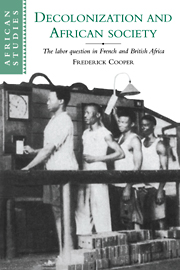Book contents
- Frontmatter
- Contents
- List of tables and figure
- Preface
- List of abbreviations
- Map of French and British colonial Africa
- 1 Introduction
- Part I The dangers of expansion and the dilemmas of reform
- Part II Imperial fantasies and colonial crises
- Introduction
- 5 Imperial plans
- 6 Crises
- Conclusion: modernity, backwardness, and the colonial state
- Part III The imagining of a working class
- Part IV Devolving power and abdicating responsibility
- Conclusion
- Notes
- Bibliography
- Index
- OTHER BOOKS IN THE SERIES
5 - Imperial plans
Published online by Cambridge University Press: 22 February 2010
- Frontmatter
- Contents
- List of tables and figure
- Preface
- List of abbreviations
- Map of French and British colonial Africa
- 1 Introduction
- Part I The dangers of expansion and the dilemmas of reform
- Part II Imperial fantasies and colonial crises
- Introduction
- 5 Imperial plans
- 6 Crises
- Conclusion: modernity, backwardness, and the colonial state
- Part III The imagining of a working class
- Part IV Devolving power and abdicating responsibility
- Conclusion
- Notes
- Bibliography
- Index
- OTHER BOOKS IN THE SERIES
Summary
French and British governments, as the war was ending, thought through their imperial futures in different ways. The British government stayed within the framework of development, the breakthrough they had made in 1939–40. To the extent that they looked to expanding African roles in politics, they did so by claiming this was established policy and they tried to shoe-horn African politics into “local government.”
The French government made its own major breakthrough to using metropolitan funds for development projects in 1946 with the inauguration of the Fonds pour 1'Investissement en Développement Economique et Social (FIDES). This in a sense put money behind the plan that Albert Sarraut had been pushing since 1923, and the importance of capital spending to improve the colonial infrastructure, broaden possibilities of production, and palliate the much-discussed shortage of labor had been vainly advocated by Popular Front, Vichy, and Free French leaders. But French officials were not so centered on development as the framework for colonial policy. They were caught up in redefining the structure of the French empire – rechristianized as the Union Française – and entered into a heated debate over the constitution of that entity. Whereas in Great Britain, post-war policy was debated above all within the Colonial Office, the French legislature engaged actively in debating the relationship of colonies to metropole, and the fact that Greater France was assumed (in different ways by left and right) to be a lasting entity made the stakes in such structural debates particularly high.
- Type
- Chapter
- Information
- Decolonization and African SocietyThe Labor Question in French and British Africa, pp. 176 - 224Publisher: Cambridge University PressPrint publication year: 1996

